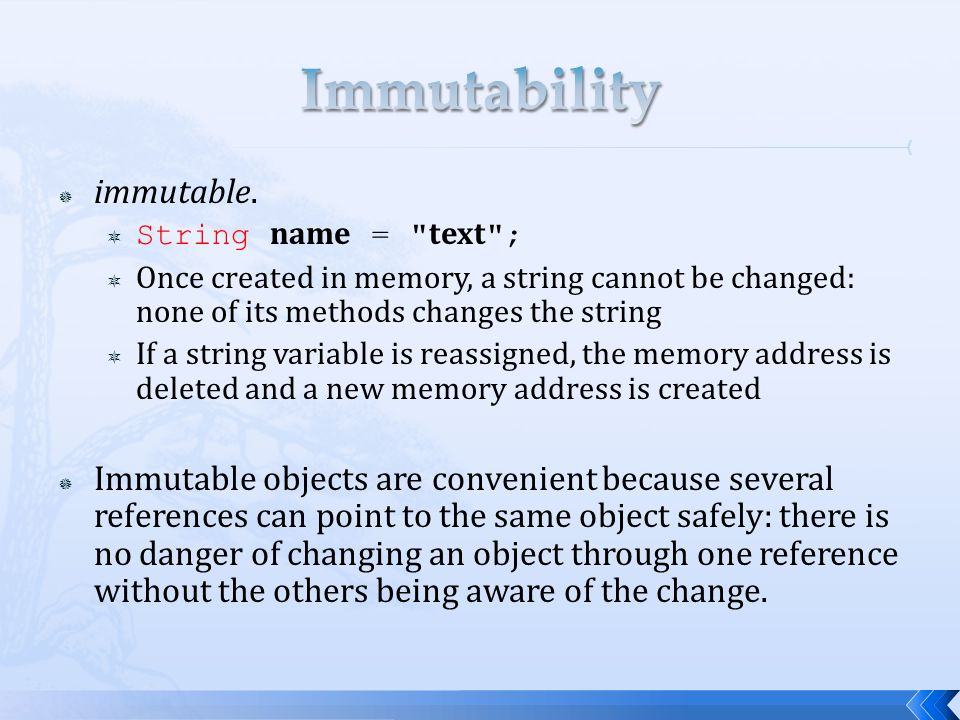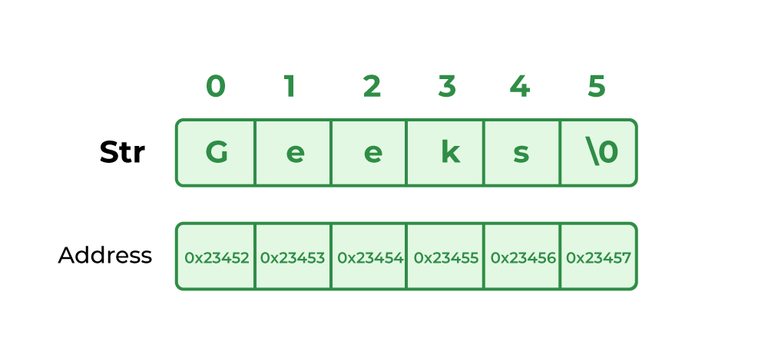Why Are Strings Immutable in Java? Insights right into Memory Performance
Why Are Strings Immutable in Java? Insights right into Memory Performance
Blog Article
What Is Immutable Strings and How It Works
In the realm of programming, comprehending the concept of immutable strings is extremely important for developing protected and robust applications. Immutable strings refer to strings that can not be altered after they are developed, ensuring data stability and predictability within the code. This essential concept plays an important duty in different programming languages and offers a special technique to managing data. By exploring the ins and outs of how immutable strings work, one can discover a world of advantages and possibilities that can elevate the high quality and efficiency of software program advancement.
The Essentials of Immutable Strings
Unalterable strings, as a basic concept in shows, are personality series that can not be transformed as soon as they are produced. This implies that when a string is designated a worth, that value can not be modified. In languages like Python and Java, strings are immutable objects, bring about different ramifications in regards to memory administration and data stability.
One of the key benefits of immutable strings is that they provide a feeling of safety in information control. Since the content of an immutable string can not be modified, it makes sure that the initial data remains undamaged, minimizing the threat of unintentional adjustments during program implementation (Why are strings immutable in Java?). This building also simplifies debugging processes, as programmers can trust that as soon as a string is specified, its worth will not be accidentally modified
When a brand-new string is developed based on an existing one, rather than changing the initial string, the brand-new worth is stored individually. Generally, recognizing the essentials of unalterable strings is crucial for understanding shows ideas and maximizing code performance.
Advantages of Unalterable Strings
Building upon the protection and effectiveness advantages of immutable strings, their advantages reach improving code dependability and simplifying concurrent shows jobs. By being unalterable, strings can not be modified after production, which removes the risk of unplanned changes in the data they keep. This inherent immutability makes sure that once a string is produced, its value remains continuous throughout the program's implementation, minimizing the possibilities of insects triggered by unexpected alterations.
In addition, unalterable strings add to code dependability by making it less complicated to reason regarding the state of a program. Considering that strings can not be altered, programmers can rely on that a string will certainly always hold the same value, simplifying debugging and upkeep efforts. This predictability brings about much more dependable and stable codebases.

Application in Shows Languages
Within different shows languages, the consolidation of unalterable strings is an essential aspect that influences just how information is taken care of and manipulated within code structures. The execution of unalterable strings differs throughout different programs languages, with each language supplying its own mechanisms to support this concept.

On the other hand, languages like C and C++ do not have integrated assistance for immutable strings. Designers in these languages have to by hand implement immutability by enforcing policies within their code to stop direct alterations to string items.
Finest Practices for Collaborating With Immutable Strings
When managing unalterable strings in programs languages like Java and Python, sticking to ideal methods guarantees safe and reliable data adjustment. Among the key ideal methods is to use StringBuilder or StringBuffer rather than directly adjusting strings, particularly when taking care of extensive concatenation procedures. These classes provide mutable alternatives for string adjustment, helping to prevent unnecessary memory allowances and improving efficiency.
In addition, when functioning with delicate information such as passwords or API keys, it is important to stay clear of saving them as simple message in immutable strings. Using secure storage devices like char arrays or specialized collections for managing sensitive information aids minimize security dangers associated with immutable strings.
Real-world Applications and Examples
Exploring practical applications of immutable strings in various markets reveals their significant influence on information integrity and system reliability. In the medical care field, immutable strings play a critical function in making certain the security and privacy of patient data. By stopping unapproved alterations to sensitive information such as clinical records and prescriptions, immutable strings aid have a peek at this website maintain conformity with stringent privacy regulations like HIPAA.
Financial establishments additionally benefit from the unalterable nature of strings to enhance the protection of consumer information and purchase records. Unalterable strings help protect against fraudulence and unauthorized alterations to economic information, providing a durable protection versus cyber dangers and making certain the trust fund and confidence of customers.

Conclusion
To conclude, immutable strings are fixed and unchangeable series of personalities that supply advantages such as string safety and improved performance in shows. They are carried out in different programming languages to ensure data honesty and protection. Best methods for functioning with unalterable strings consist of preventing straight modifications and using techniques that return brand-new string items. Real-world applications of unalterable strings consist of data file encryption, caching, and string control jobs.
Unalterable strings refer to strings that can the original source not be modified after they are developed, making sure data stability and predictability within the code. When a new string is produced based on an existing one, rather than changing the original string, the new value is kept individually.In languages like Java and Python, strings are immutable by default, implying that once a string object is produced, its value can not be changed - Why are strings immutable in Java?. Best techniques for working with unalterable strings include preventing straight alterations and utilizing techniques that return brand-new string items. Real-world applications of immutable strings include information encryption, caching, and string adjustment jobs
Report this page